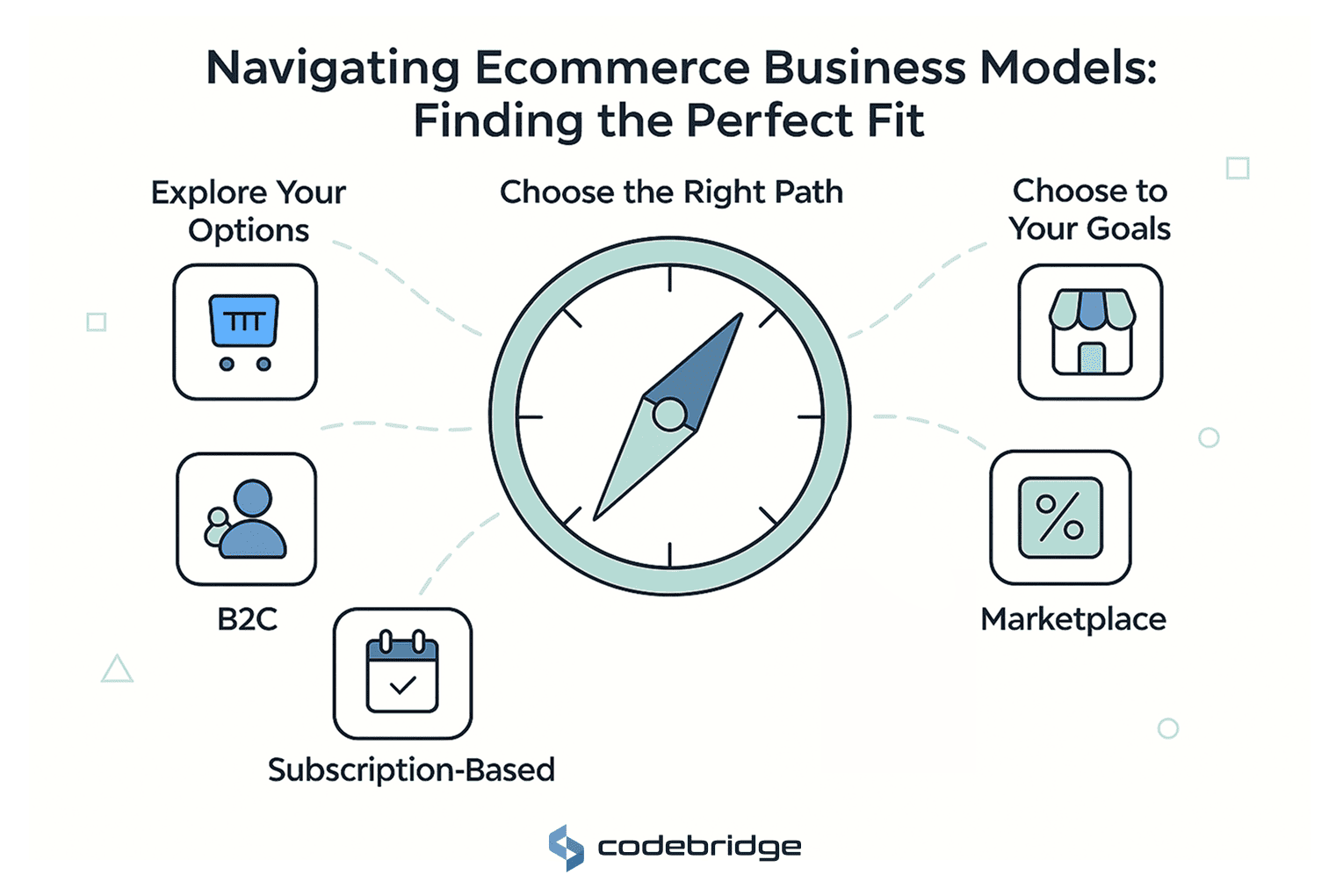Ecommerce is evolving fast — and so are consumer habits. According to Statista, over 268 million people in the U.S. made digital purchases in 2022. On a global scale, more than 6.8 billion people are expected to use smartphones in 2024, giving ecommerce apps an unprecedented reach.
On a global scale, more than 6.8 billion people are expected to use smartphones in 2024, giving ecommerce apps an unprecedented reach.
What’s more, by 2025, 72% of all internet users will access the web exclusively via smartphones, according to CNBC. This shift underscores the critical need for ecommerce applications that are not only mobile-friendly — but mobile-first.
Also, UI/UX design has a critical factor in the success of an ecommerce application. It's important to choose the right technology stack to ensure the app is scalable and performs well.
The development process involves several key steps. These include conducting a competitive analysis, selecting the right business model, and setting clear goals and objectives.
This guide will walk you through these key steps in ecommerce mobile app development to provide you a comprehensive understanding of the process, highlighting best practices and important considerations.

Understanding the Ecommerce Market and Audience
The first step in ecommerce mobile app development is to understand the market and your audience. Every successful ecommerce app begins with in-depth market research. This research uncovers trends, preferences, and consumer behavior patterns within the target demographic.

Understanding market dynamics provides insights into competitors’ strategies. Identifying gaps or opportunities in the market can set your ecommerce app apart. This knowledge serves as a foundational pillar for building a unique and compelling ecommerce application. It is essential to revisit and adapt this understanding as markets evolve.
Defining Your Ecommerce Application's Unique Value Proposition
Creating a unique value proposition (UVP) is crucial in differentiating your ecommerce mobile app from competitors. A well-defined UVP highlights what sets your app apart and why customers should choose it over others. It communicates the specific benefits and unique features that your app offers to its users.
Your UVP should be concise, clear, and resonate with your target audience. It must be integrated across all touchpoints, from app store descriptions to marketing campaigns. A strong UVP not only attracts new users but also builds long-term loyalty by clearly communicating the value your ecommerce application brings to their shopping experience.
Conducting Competitive Analysis
Conducting a competitive analysis is a vital step in ecommerce mobile app development. This process involves evaluating your competitors' strengths and weaknesses. Understanding their strategies helps you identify opportunities and threats within your market.
In today’s competitive retail landscape, simply offering products online isn’t enough. To stand out, ecommerce businesses need to engage users on a deeper, more interactive level. For example, gamification could be one of the most powerful tools to achieve this. Dive deeper into how gamification is revolutionizing online retail in our full article.
Finally, use this analysis to find gaps in the market and potential areas for innovation. By leveraging this data, you can tailor your ecommerce app to offer unique solutions that meet unmet needs. This strategic approach not only helps you carve out a niche in the market but also ensures your app remains competitive and appealing to your target audience.

Selecting the Right Business Model
Selecting an appropriate business model is crucial for your ecommerce application's success. The right model aligns with your app's goals and audience needs. It impacts pricing, revenue streams, and growth potential.

Begin by exploring various ecommerce business models, such as B2C, B2B, or C2C. Consider models like subscription-based, freemium, or marketplace platforms. Each model offers distinct advantages and challenges, so choosing the right fit is essential. Read how we helped a client choose and scale the right ecommerce model in our case studies.
Setting Clear Goals and Objectives
Establishing clear goals and objectives for your ecommerce mobile app is critical. These serve as a roadmap guiding your development and marketing efforts. Begin by identifying what success looks like for your app.
Consider both short-term and long-term goals. Short-term goals might focus on launching the app or acquiring a specific number of users. Long-term goals could include expanding to new markets or achieving certain revenue benchmarks.
Each objective should be specific, measurable, achievable, relevant, and time-bound (SMART). This framework ensures that your goals are realistic and trackable. By setting precise goals, your team stays focused and motivated, making strategic decisions easier.

Choosing the Appropriate Technology Stack
Selecting the right technology stack is pivotal in ecommerce mobile app development. It influences your app's performance and scalability. Begin by assessing your project's specific needs and objectives.
Consider factors such as development time, cost, and future scalability when choosing between technologies. Popular stacks include MEAN, MERN, and LAMP, but make sure they align with your business model. Each stack offers different benefits, so evaluate them carefully.
Compatibility with existing systems is also crucial. Ensure seamless integration with databases and third-party services. A well-chosen technology stack not only optimizes performance but also enhances user satisfaction and supports long-term growth. It provides the foundation on which your ecommerce application can thrive and adapt to changing demands. Not sure which stack is right for you? Our team will help you decide during our technical consulting sessions.
Conclusion: The Continuous Evolution of Ecommerce Applications
Ecommerce applications are constantly evolving to meet changing user expectations and market demands. This dynamic nature requires adaptability from developers and business owners. Staying updated with the latest trends is crucial for sustaining success.
Technological advancements continuously offer new opportunities and challenges. Incorporating innovations like artificial intelligence or virtual reality can enhance user experience. However, understanding when and how to integrate such technologies is vital. Let’s talk about how Codebridge can build your next ecommerce application. Contact us today.
FAQ
What are the key steps involved in ecommerce mobile app development?
The main steps include market research, feature planning, UI/UX design, backend development, payment integration, testing, deployment, and ongoing updates. Following this structured process ensures a smooth development cycle and a user-friendly ecommerce app.
Why is market research essential before building an ecommerce mobile app?
Market research helps identify customer needs, analyze competitors, and validate your product’s value. This ensures you build features that resonate with your audience while avoiding unnecessary development costs. A data-driven approach increases your chances of market success.
How important is UI/UX design in ecommerce app development?
UI/UX design is crucial because ecommerce apps rely on smooth navigation, engaging visuals, and intuitive layouts to drive conversions. A well-designed interface improves customer satisfaction, reduces friction, and boosts sales by making shopping effortless.
What features should be prioritized in an ecommerce mobile app?
Essential features include product listings, search and filters, secure checkout, multiple payment options, user accounts, order tracking, push notifications, and customer reviews. Prioritizing these features ensures a fully functional foundation for your ecommerce experience.
Why is testing a critical step in ecommerce mobile app development?
Testing identifies bugs, performance issues, and security vulnerabilities before launch. Ecommerce apps must deliver seamless transactions, fast load times, and reliable behavior. Thorough testing ensures a stable, secure, and trustworthy app that users feel confident using.
What should businesses consider after launching an ecommerce mobile app?
After launch, businesses should monitor user behavior, gather feedback, optimize performance, and introduce new features based on demand. Regular updates, promotional campaigns, and A/B testing improve engagement and ensure long-term success in a competitive ecommerce market.













%20(1).jpg)
%20(1)%20(1)%20(1).jpg)


